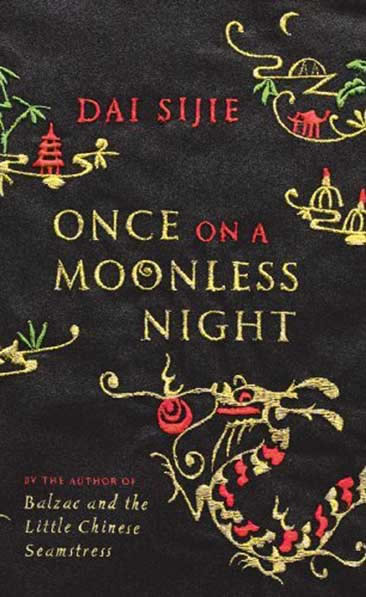 Dai Sijie is perhaps best known for his first novel, Balzac and the Little Chinese Seamstress, an international bestseller subsequently made into a successful film. In it, two Chinese boys of bourgeois family who have been sent to be “re-educated” attempt to widen a young girl’s horizons by illicitly bringing her European literature. It was, by all accounts, a moving and poignant story; perhaps because of its essentially auto-biographical nature.
Dai Sijie is perhaps best known for his first novel, Balzac and the Little Chinese Seamstress, an international bestseller subsequently made into a successful film. In it, two Chinese boys of bourgeois family who have been sent to be “re-educated” attempt to widen a young girl’s horizons by illicitly bringing her European literature. It was, by all accounts, a moving and poignant story; perhaps because of its essentially auto-biographical nature.
Once on a Moonless Night is Sijie’s third novel, and it appears to be an altogether different matter. The Last Emperor of China, impotent, homosexual Puyi, when he’s not being imprisoned, is either being fed aphrodisiacs or being cradled in the arms of his Japanese sumo wrestler servant. Unsurprisingly, he begins to go a little nuts and becomes obsessed with the works of one of his ancestors, the Emperor Huizong, whose life parallels his own. This Huizong was the owner of a particular scroll, said to contain a saying of the Buddha himself. Only problem is – it’s written in a language that nobody can understand. Shocker! What’s Puyi to do, other than, in a fit of mad rage as he’s hallucinating a vast black dragon (whilst being flown away by the Japanese), tear the scroll apart with his teeth?
The scroll falls at the feet of an ex-aristocrat and passes into legend. Fast forward to the Seventies, and a young, desperately dull female translator learns of it from a Chinese professor; she develops a mania about a missing half. This plot (if it can be called as such, as scrabbling to find it was harder than locating water on Mars) is the backbone of the novel. In her endless travails she meets a red-haired grocer called Tumchooq whose name also happens to be that of the language in which the benighted scroll was written; she falls in love with him (somewhat mysteriously) and then for no apparent reason clears off to Africa to build schools.
One ought to care about finding the missing half; one ought to feel for the unnamed narrator, but there are so many problems with this book that one is left feeling not only perplexed but also irritated. The prose is so lifeless that it is impossible to make any kind of connection with the undoubtedly fascinating subject matter that Sijie has chosen. The second problem is the central quest – this is the half of the scroll in the narrator’s possession:
“Once on a moonless night a lone man is travelling in the dark when he comes across a long path that merges into the mountain ... halfway along, at a turn in the path, he stumbles. As he falls, he clutches at a tuft of grass, which briefly delays a fatal outcome, but soon his hands can hold him no longer ... He casts one last glance below, where he can see only the darkness of those unfathomable depths...”
And.... is it really worth a lifetime’s work to go trekking after the ending to this little fable? And when it does come (and, thank Buddha, it does) it is of such crashing banality that one can’t help feeling cheated.
There are some excellent bits to the work – the chapter dealing with Puyi has moments of elegance, vitality and even (Lord save us) some smatterings of wit. But if I found half of this novel sitting on a train (no doubt having been ripped in half by its owner), I’m not sure I’d care very much about looking for the rest of it.
One on a Moonless Night is published by Chatto & Windus

